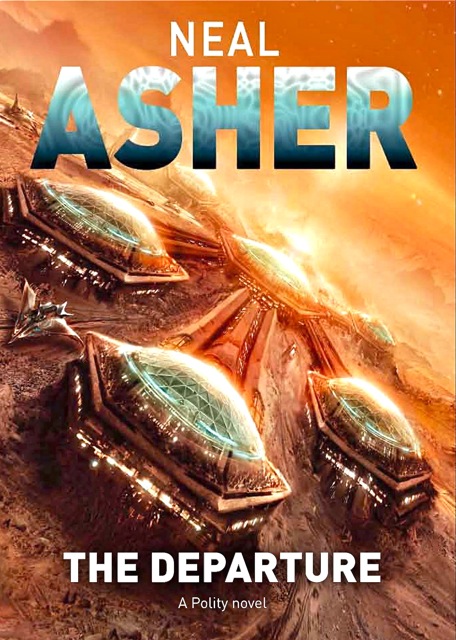Neal Asher, The Departure
reviewed by Danielle L. Parker

The Departure Publisher: Night Shade Books, 2011 Length: ISBN: 978-1-59780-447-9 |
I’ll say right up front I’m a Neal Asher fan. I’ll also say right up front that as far as I can tell, the Brits are beating the pants off us as the best science fiction writers out there now.
That wasn’t the case fifty years ago, of course, and the current raft of science fiction tomes emitting from the U. K. share a few characteristics I’m not all that fond of. One of the annoying traits is these books run gadzillion pages. They birth monster-eyestrain headaches in the poor slobs trying to finish before the cuckoo chirps twelve bells. But the fact we try to beat pumpkin hour means we’ve been lured on by the pages.
And our British friends generally showcase a nasty, brutish and jaw-dropping violent view of the future. Why? Maybe the Brits are cynics. But I suspect really because when you imagine a future world of unremitting horror and nastiness, like the Third Reich-Big Brother on steroids government of Neal Asher’s Owner series, you have a good excuse to write take-no-prisoners-blow-up-the-civilians-with-a-nuke responses for your “hero.” Everyone in authority is so bad, so horrible, so nasty, all the ramped-up violence you envision in response doesn’t stir a moral twinge in your readers. You got a Hitler in charge? Okay to blow him up, then, along with all his cohorts, right? Lots of action!
So more characteristics of recent British science fiction I sometimes find less than lovable. No demolition derby has more bangs and smashes and explosions than you find in these pages. But what can I say? The Brits do over-the-top with such style.
The Departure starts with a man who wakes up minutes away from the public incinerator. Alan Saul has memories of torture and a face to go along with his pain, but little else of his past. An A.I., which springs to consciousness at the same time as Saul wakes to his blank slate and toasting toes, is Saul’s only other clue to his past.
But Saul knows the face of his torturer and the totalitarian government that rules this overcrowded, decaying future. That’s enough for him. Saul has both revenge on his torturer and destruction of Big Brother Gestapo (the Inspectorate) on his agenda. And since Saul appears to be a post-human man, with a mystery artificial intelligence embedded in his head and (conveniently) also in the world-wide Govnet, he has a good shot at achieving that agenda. And it’s one wild ride to the finish...
Most modern writers envision “post-human man” as some sort of hybrid human-artificial intelligence. Does knowing pi to three million places make man super-human? It’s a pretty common extrapolation in modern science fiction. But I wonder. Computers are both genius and idiot at the same time (and I’ve known some persons who fit that same description). Are there other ways to measure intelligence besides bandwidth and raw computing power? I’d love to see visions of “post human” besides A.I.-human cyborg. Must we all be Borgified?
But I suppose what really makes “superman” is power, pure and simple. Nietzsche was sadly too right. And as our society becomes increasingly “gridlinked” (to use one of Asher’s own terms), power comes through control of artificial intelligences and telecommunications. So until science fiction writers define “power” in other terms, we’ll continue to see those ubiquitous man-machine supermen of the future.
Asher has a gift for writing the violent action characteristic of modern British science fiction. And his hero, Alan Saul, manages to hold on to (barely) enough humanity to make his wild ride to revenge and the stars interesting. Enjoy the explosions and take off for Mars!
Copyright © 2013 by Danielle L. Parker

